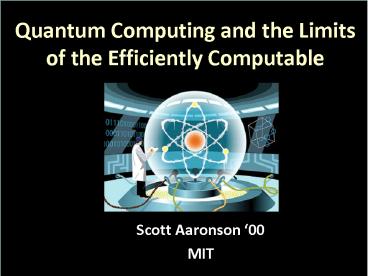Quantum Computing and the Limits of the Efficiently Computable - PowerPoint PPT Presentation
Title: Quantum Computing and the Limits of the Efficiently Computable
1
Quantum Computing and the Limits of the
Efficiently Computable
- Scott Aaronson 00
- MIT
2
(No Transcript)
3
Moores Law
4
Extrapolating Robot uprising?
5
But even a killer robot would still be merely a
Turing machine, operating on principles laid down
in the 1930s
6
Is there any feasible way to solve these
problems, consistent with the laws of physics?
And its conjectured that thousands of
interesting problems are inherently intractable
for Turing machines
7
Old proposal Dip two glass plates with pegs
between them into soapy water. Let the soap
bubbles form a minimum Steiner tree connecting
the pegsthereby solving a known NP-hard problem
instantaneously
8
Relativity Computer
DONE
9
Zenos Computer
Time (seconds)
10
Time Travel Computer
S. Aaronson and J. Watrous. Closed Timelike
Curves Make Quantum and Classical Computing
Equivalent, Proceedings of the Royal Society A
465631-647, 2009. arXiv0808.2669.
11
What About Quantum Mechanics?
Like probability, but with minus signs
12
Quantum Computing
Where we are A QC has now factored 21 into 3?7,
with high probability (Martín-López et al.
2012) Scaling up is hard, because of decoherence!
But unless QM is wrong, there doesnt seem to be
any fundamental obstacle
A general entangled state of n qubits requires
2n amplitudes to specify
Presents an obvious practical problem when using
conventional computers to simulate quantum
mechanics
Feynman 1981 So then why not turn things around,
and build computers that themselves exploit
superposition?
Shor 1994 Such a computer could do more than
simulate QMe.g., it could factor integers in
polynomial time
13
But factoring is not believed to be
NP-complete! And today, we dont believe quantum
computers can solve NP-complete problems in
polynomial time in general (though not
surprisingly, we cant prove it)
Bennett et al. 1997 Quantum magic wont be
enough
If you throw away the problem structure, and just
consider an abstract landscape of 2n possible
solutions, then even a quantum computer needs
2n/2 steps to find the correct one (That bound
is actually achievable, using Grovers algorithm!)
If theres a fast quantum algorithm for
NP-complete problems, it will have to exploit
their structure somehow
14
Quantum Adiabatic Algorithm(Farhi et al. 2000)
Hi
Hf
Hamiltonian with easily-prepared ground state
Ground state encodes solution to NP-complete
problem
Problem Eigenvalue gap can be exponentially
small
15
Some Examples of My Research on Computational
Complexity and Physics
BosonSampling (with Alex Arkhipov) A proposal
for a rudimentary photonic quantum computer,
which doesnt seem useful for anything (e.g.
breaking codes), but does seem hard to simulate
using classical computers
(We showed that a fast, exact classical
simulation would collapse the polynomial
hierarchy to the third level)
Experimentally demonstrated (with 3-4 photons)
by groups in Brisbane, Oxford, Vienna, and Rome!
16
Computational Complexity of Decoding Hawking
Radiation
Firewall Paradox (2012) Hypothetical experiment
that involves waiting outside a black hole for
1070 years, collecting all the Hawking photons
it emits, doing a quantum computation on them,
then jumping into the black hole to observe that
your computation nonlocally destroyed the
structure of spacetime inside the black
hole Harlow-Hayden (2013) Argument that the
requisite computation would take exponential time
(21070 years) even for a QCby which time the
black hole has already fully evaporated!
Recently, I strengthened Harlow and Haydens
argument, to show that performing the computation
is generically at least as hard as inverting a
one-way function
17
Summary
Quantum computing really is one of the most
exciting things in sciencejust not for the
reasons you usually hear Quantum computers are
not known to provide any practically-important
speedups for NP-complete problems (though they
might provide modest ones, and they almost
certainly provide speedups for problems like
factoring and quantum simulation) And building
them is hard (though the real shock for physics
would be if they werent someday possible) On the
other hand, one thing quantum computing has
already done, is create a bridge between computer
science and physics, carrying nontrivial insights
in both directions































